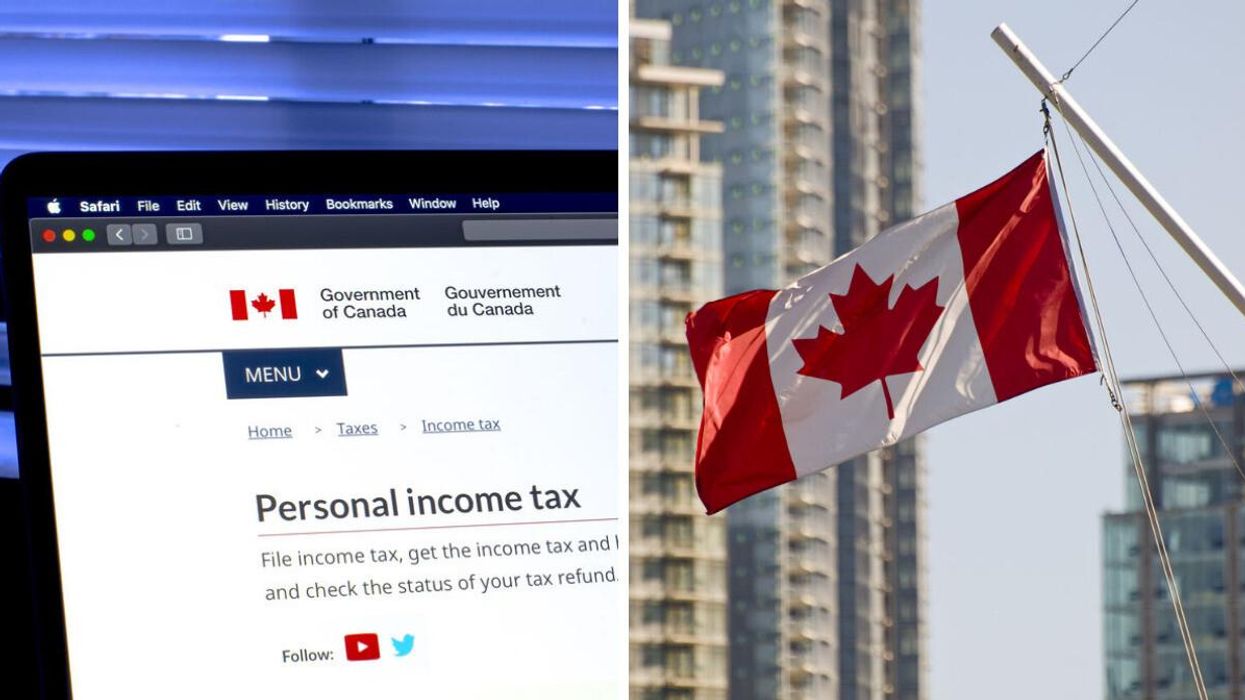Canada's New Tax Brackets For 2023 Are Out & This Is How Much You'll Be Forking Out
What you can expect to pay based on your income. 💸

The Canadian tax website. Right: A Canadian flag.
New year, new tax brackets!
Canada's tax brackets for 2023 have just been announced and this will give you a better idea of how much you'll be paying according to your income.
Recently released by the Canada Revenue Agency (CRA), these new tax rates will apply to your income in 2023. So, while you won't have to worry about them for the upcoming tax season, it is something to consider when it's time to pay your taxes next year.
So, depending on how your economic situation may have changed, as well as the parameters of the brackets, you may be paying more or less tax for 2023 based on your income.
Here's what you need to know:
What are the tax brackets in Canada for 2023?
If you're unfamiliar, it's important to mention that Canada has a marginal tax system. This means that the amount you are taxed is based on how much taxable income you make.
Basically, the more you make, the higher percentage of your income is taxed. It's also important to note that only the portion of income inside a given tax bracket is subject to its tax rate.
According to the CRA, the lowest tax bracket on a federal level in Canada is 15% in 2023. To qualify for that, you need to make a taxable income of $53,359 a year or less.
For those making a taxable income between $53,359 and $106,717 the tax rate will be 20.5% for every dollar after $53,359 and before $106,717.
If you make between $106,717 and $165,430, the tax rate will be 26%, while the tax rate for people who make between $165,430 and $235,675 will 29%.
The highest federal tax rate on taxable income is 33%, and this is for those who make more than $235,675 a year.
Because the federal government and the provinces provide different services that require money from their citizens, your province will also have its own tax system.
So, your taxes can change a lot depending on the province or territory you live in.
Plus, some Canadians also are tax exempt if they make below the basic personal amount. So, you can expect a tax rate of 0% if you make below $15,000 a year.
How can I calculate my tax?
If you're a bit confused about what your taxes are going to look like, the CRA has a handy online tax calculator to help you understand your situation a little bit better.
On their site, it walks you through how to calculate your taxes depending on your income. Easy!
When is the tax deadline in Canada?
If you're looking at filing a tax return this year or next year, the deadline is always April 30.
This only changes if that date, like in 2023, is on a weekend. In these cases, the deadline is shifted over to the next available work day, which is typically either May 1 or May 2.
So, if you want to make sure your tax return and payments are in on time, have everything sent or, at the very least, post-marked for that day.
Hopefully, with this information, you'll have a better idea about the taxes you'll owe in 2023.
Sorry, folks!
- These Are Canada's Tax Brackets For 2022 & Here's What It Means For Your Taxes ›
- Canada's New Luxury Tax Just Kicked In & Here's What's Going To Cost Even More ›
- 7 Ways Students In Canada Can Save Money At Tax Time, According To The CRA ›
- 7 Tax Credits & Expenses You Can Claim In 2023 That Could Save You Money When Filing - Narcity ›
- This Is The 2022 Tax Deadline In Canada & Exactly What You Need To Submit On Time - Narcity ›
- 8 Credits, Rebates & Grants Canadian Homeowners Can Claim On Their Taxes - Narcity ›
- These Are The CRA Services Available Online & You Can Actually Do So Much Without Calling In - Narcity ›
- Canada's Tax Brackets For 2024 Are Out Now & This Is How Your Taxes Will Be Impacted - Narcity ›
- Federal Benefits & Credits: What's Tax-Free & What You'll Have To Claim On Your Tax Return - Narcity ›
- Here's What You Need To Know About Canada's Tax Brackets When Filing Your Tax Return This Year - Narcity ›